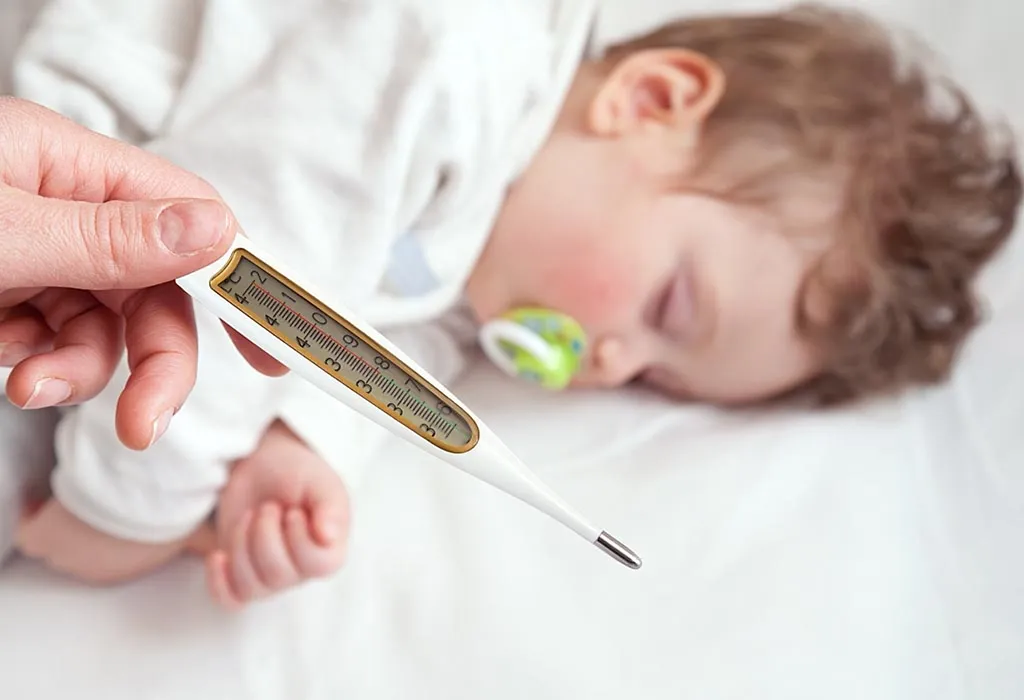What Should Be The Fever in Babies?
If you’re a new parent or caregiver, dealing with a baby’s fever can be a stressful and concerning experience. Understanding what constitutes a fever in infants, as well as knowing when to seek medical attention, is crucial for ensuring the well-being of your little one. In this blog post, we will discuss everything you need to know about baby fever, including how to determine a normal body temperature for babies, common causes of fever in infants, and when it’s time to seek professional help. We’ll also explore some effective home remedies for reducing baby fever, providing you with the knowledge and tools to confidently manage this common childhood ailment.
Understanding Fever in Babies
Have you ever felt worried and anxious when your baby develops a fever? It’s a common concern for many parents, but understanding fever in babies can help ease your worries and ensure you take the right steps to help your little one feel better.
When it comes to fever in babies, it’s important to know what is considered a normal body temperature for infants. Generally, a normal baby body temperature falls between 97°F (36.1°C) and 100.3°F (37.9°C). Anything above this range could indicate a fever in babies, which may be a sign of an underlying illness.
If you notice a fever in your baby, it’s crucial to determine the cause. There are various factors that can lead to a fever in infants, such as viral or bacterial infections, teething, or exposure to extreme temperatures. Understanding the potential causes can help you address the issue effectively and seek appropriate medical care when needed.
Determining Normal Baby Body Temperature
When it comes to fever in babies, it’s important for parents to understand what constitutes as a normal body temperature for their little ones. Knowing the baseline temperature for infants can help in determining when a fever is present and when it’s time to seek medical attention. In this article, we will discuss the factors that affect normal baby body temperature and how to accurately determine if your baby has a fever.
Normal baby body temperature can range between 97°F (36.1°C) and 100.3°F (37.9°C). A baby’s temperature can fluctuate throughout the day, with slightly higher readings in the late afternoon and early evening. Factors such as activity level, clothing, and room temperature can also affect a baby’s body temperature. It’s important to take these factors into consideration when determining if your baby has a fever.
One of the most effective ways to accurately determine if your baby has a fever is by using a thermometer. There are different types of thermometers available, including digital, ear, forehead, and pacifier thermometers. It’s important to follow the manufacturer’s instructions when using a thermometer and to place it in the correct location for an accurate reading.
Causes Of Fever In Infants
Fevers in infants can be a cause for concern for many parents. It’s always important to keep a close eye on your baby’s temperature and know what may be causing a fever to occur. There are several causes of fever in infants that every parent should be aware of in order to ensure the health and well-being of their little one.
One common cause of fever in infants is viral or bacterial infections. These can include respiratory infections, urinary tract infections, and ear infections. When a baby’s immune system is still developing, they are more susceptible to picking up these types of infections, which can result in a fever. It’s important to monitor your baby closely and seek medical attention if you notice any symptoms of infection.
Another potential cause of fever in infants is teething. While some parents may not initially associate teething with fever, it is actually quite common for babies to experience a slight increase in body temperature while teething. This is typically not a cause for concern, but it’s always a good idea to consult with your pediatrician if you have any doubts.
When To Seek Medical Attention For Fever in Babies
It’s a common concern for parents to worry about their baby’s health, especially when it comes to fever in babies. Fever is the body’s natural response to infection and can be a sign that your baby’s immune system is working to fight off illness. However, it’s important to know when to seek medical attention for your baby’s fever.
One key factor to consider is your baby’s age. For infants younger than 3 months old, any fever should be taken seriously and prompt medical attention should be sought. This is because young babies have immature immune systems and are at higher risk for serious infections. On the other hand, if your baby is older than 3 months and has a fever of 100.4°F or higher, it’s also important to consult a doctor.
Additionally, if your baby is showing other concerning symptoms along with the fever, such as difficulty breathing, persistent vomiting, or extreme irritability, it’s crucial to seek medical care right away. These could be signs of a more serious underlying illness that requires professional evaluation and treatment.

Home Remedies For Reducing Baby Fever
When a baby is running a fever, it can be a worrisome time for parents. While it is important to seek medical attention for high fevers or fevers that persist for an extended period of time, there are also some home remedies that can help to reduce a baby’s fever and make them more comfortable.
One of the most effective home remedies for reducing a baby’s fever is to keep them well-hydrated. Make sure to offer them plenty of breastmilk or formula, and if they are old enough, water or clear fluids. It’s also a good idea to dress them in light, breathable clothing and keep the room temperature comfortable.
In addition to fluids, a lukewarm bath can help to bring down a baby’s fever. Make sure the water is not too cold or too hot, and gently sponge them down to cool their skin. You can also use a fan to create a gentle breeze and help to keep them cool. And of course, plenty of rest is essential for a speedy recovery.
Frequently Asked Questions
How do I determine the normal body temperature for my baby?
The normal body temperature for a baby is typically between 97°F and 100.3°F (36.1°C and 37.9°C). It’s best to use a digital thermometer to get an accurate reading.
What are the common causes of fever in infants?
Fever in infants can be caused by a variety of factors, including viral or bacterial infections, teething, immunizations, and overdressing.
When should I seek medical attention for my baby’s fever?
You should seek medical attention for your baby’s fever if they are under 3 months old and have a rectal temperature of 100.4°F (38°C) or higher, or if they are between 3-6 months old and have a rectal temperature of 102°F (38.9°C) or higher.
What are some home remedies for reducing my baby’s fever?
Home remedies for reducing your baby’s fever may include giving them a lukewarm bath, dressing them lightly, offering them cool fluids, and using a fever-reducing medication as recommended by your pediatrician.
Should I be worried about baby fever? What are the signs of a serious problem?
While fever itself is not usually a cause for concern, there are certain signs that may indicate a serious problem, such as difficulty breathing, a stiff neck, a rash that doesn’t fade under pressure, or extreme irritability.
How do I recognize baby fever?
Baby fever can be recognized by a feeling of warmth when you touch your baby’s skin, flushed cheeks, irritability, and poor appetite.
Can teething cause baby fever?
Teething can cause a slight increase in body temperature, but a fever higher than 100.4°F (38°C) is not typically attributed to teething alone. If your baby is experiencing a high fever while teething, it’s best to consult a pediatrician.
You can also check our article about soup recipes for winter.











